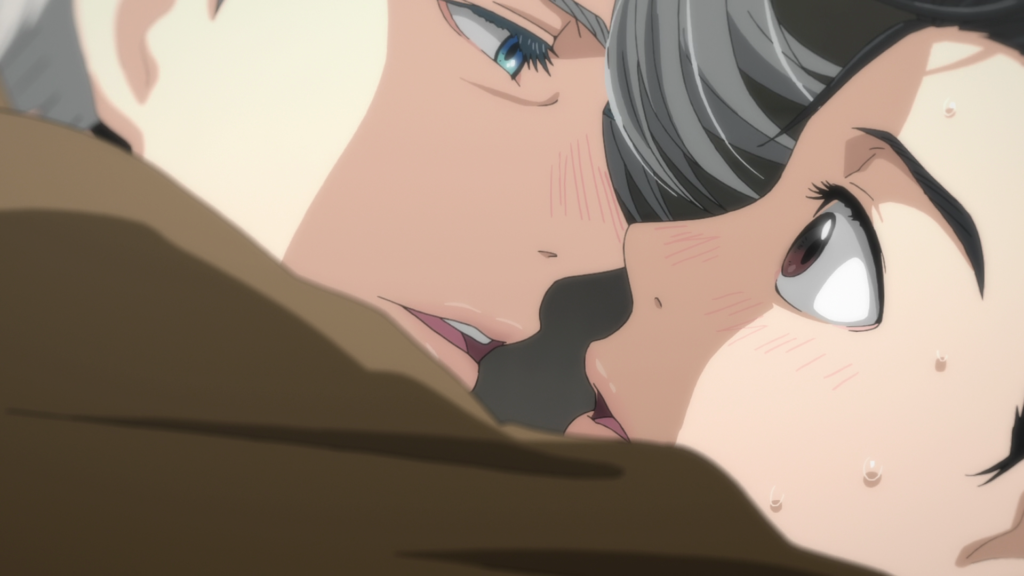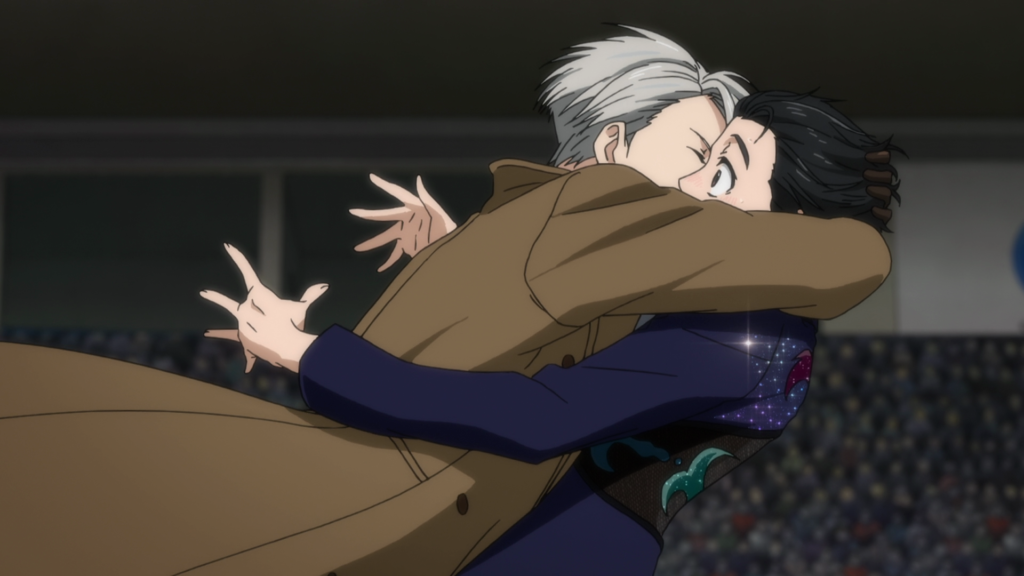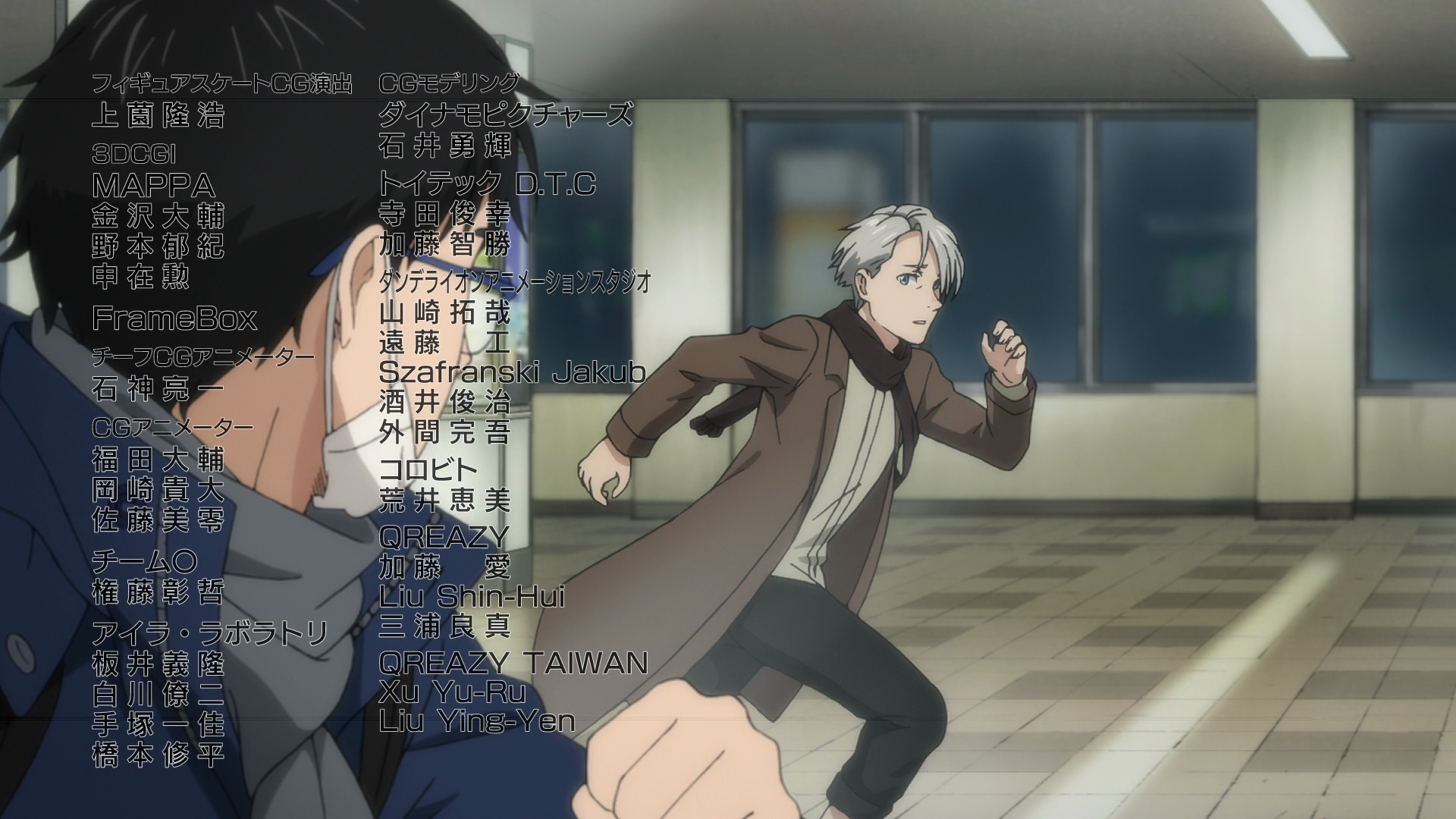The Best LGBT Films and Shows to Watch Online
Celebrate Pride with these movies and TV shows available on popular streaming services. (Good news: a lot of them are available for free.)
Incluvie Foundation Gala - Learn More
(This article contains major spoilers for Yuri!!! on Ice.)
When I started watching Yuri!!! on Ice, I thought I knew what I was getting into. I’ve been a fan of sports anime for years, and a fan of anime in general for longer. Sports anime makes up a broad and increasingly popular swath of anime offerings, and as with any genre, there are certain conventions I’ve come to expect: a loveable underdog making a surprising comeback, detailed explanations of a game’s rules and strategy that somehow get me to care about sports, teams learning to cooperate and developing their relationships both on and off the court.
This last feature of sports anime may be what makes it so profitable. Because sports anime tends to feature large casts of men and few (if any) female characters, and because the male characters’ interactions tend to be both physically and emotionally intense, the genre provides ample fodder for yaoi fans. These fans are often (but not always) straight women who find the idea of male/male relationships compelling or titillating. Most yaoi fans don’t expect or even want these relationships to become canonical. Instead, the characters serve as inspiration for their own fantasies and fan-created content. However, sports anime also pulls in LGBT fans hoping for legitimate representation.
I was one of these fans. Free! introduced me to sports anime, and I’m a bit embarrassed to admit how long I held on to the belief that the same-gender relationships in the show would eventually become romantic. While I still enjoy sports anime — Haikyuu!!’s excellent 4th season got me through my last few months of COVID lockdown — I’ve learned not to expect more from sports anime when it comes to LGBT representation.
I went into Yuri!!! on Ice with this skeptical mindset. The show plunged me into the world of competitive figure skating via Yuri Katsuuki, a Japanese skater who experiences a crushing defeat at the Grand Prix in the series’ first episode. As he spirals into anxiety and self-doubt, the audience learns about Yuri’s past. Much of Yuri’s drive to skate competitively came from his admiration of Victor Nikiforov, Russia’s top figure skater. In a flashback, a young Yuri watches Victor skate on TV and reacts in a way that mirrors a sexual awakening. I saw echoes of myself in Yuri — many gay or bisexual teens experience a similar awakening because of a favorite celebrity — but as I expected, the implication that Yuri had a crush on Victor initially remained just that: an implication.
In the present day, Yuri still admires Victor and even has posters of Victor in his room. He practices one of Victor’s skating routines and performs it for a friend, not realizing that his friend’s daughters are filming him. The girls post the video online and it goes viral, eventually reaching Victor himself. Episode 1 ends with Victor surprising Yuri at his family’s hot spring, completely naked, and offering to become Yuri’s coach.
It goes without saying: this is pretty dang gay. It’s also pretty typical of homoerotic fanservice. I’m used to anime putting male characters into sexually-charged scenarios that never go further than innuendo. So when Victor greeted Yuri in the nude, or when he asked if Yuri wanted to share a bed, or when he grabbed Yuri’s chin and tilted his face up as if about to kiss him, or when he challenged Yuri to seduce him during one of his routines, my main reaction was, “Here we go again.”
Still, I stuck with Yuri!!! on Ice, mostly because Victor and Yuri’s relationship compelled me in ways that went beyond these moments of sexual tension. By episode 4, Yuri feels comfortable enough with Victor to open up about his insecurities, particularly his experiences with people violating his boundaries and his struggles with forming new relationships. He admits that he’s been especially nervous around Victor because he’s admired him for so long and doesn’t want Victor to see his perceived weaknesses. Victor listens to him closely and reassures him without pushing Yuri past his comfort zone. “When I open up,” Yuri narrates, “he meets me where I am.”
As someone who struggles with social anxiety, this interaction touched me deeply. I found myself relating to Yuri on multiple levels: his mental health struggles, his implied gayness, and his gender nonconformity. When Victor choreographs a short program with the theme of erotic love, he challenges Yuri to tap into his sensual side. At first, Yuri tries to channel his sexuality by building a story to fit the routine, one in which he’s a man being seduced by a femme fatale. He ultimately realizes that he feels more comfortable imagining himself as the woman in the story, and he performs the routine in an old costume of Victor’s that intentionally blurs gender lines. Like myself and many other LGBT people, Yuri becomes more comfortable with his sexuality when he steps outside of gendered assumptions.
Yuri’s not the only one overcoming his insecurities. Victor hides his doubts behind a flamboyant public persona, which is as much of a coping mechanism as Yuri’s reservedness. The more time Victor spends with Yuri, the more we see his mask slip. His over-the-top and highly sexualized flirting gives way to quieter moments of connection and vulnerability. Through his narration, we learn that Victor desperately wants to make Yuri happy and worries about letting him down as a coach.
His worries aren’t unfounded: Victor’s inexperience as a coach eventually leads to conflict. When he sees that Yuri’s consumed with anxiety before a crucial performance, Victor tries to motivate him by suggesting that he’ll resign as Yuri’s coach if he performs poorly. Yuri is understandably distraught, and the argument that ensues forces Victor to confront his inexperience and motivates Yuri to prove himself to Victor and the world. This scene humanizes both characters and makes their relationship feel more genuine because of its flaws. I became increasingly invested in the relationship — and, by extension, increasingly prepared for disappointment.
And then this happened.


Despite Victor’s conveniently placed arm, there’s no question about what’s going on here. Between the close-up shot of their faces, the crowd’s shocked reaction, and the lead writer’s roundabout confirmation on Twitter, not even my skepticism could deny the truth: Victor and Yuri kissed. After so many years of learning not to hope for more from sports anime, I’d been given more than I would have thought to ask.
In fact, I was so shocked by the kiss that the monumental shift in their relationship didn’t fully register until two episodes later. Victor’s dog, who’s been staying with Yuri’s family in Japan, has an unexpected health emergency. Upon Yuri’s urging, Victor flies back to Japan to be with him. Yuri skates a less-than-spectacular long program without Victor supporting him, but his high score in the short program allows him to scrape into the finals. He returns to Japan and shares an emotional reunion with Victor at the airport. They see each other through a glass wall and hold each other’s gaze as they rush to the sliding doors. Yuri runs into Victor’s arms and says that he wants Victor to remain his coach until he retires — a declaration that Victor likens to a marriage proposal.


This scene, even more so than the kiss, made their relationship real to me. After all, the airport reunion is one of the most well-worn romantic clichés out there. As I watched Victor and Yuri run to each other (while maintaining eye contact! I cannot stress that enough, folks!), it finally sunk in. I was watching a sports anime about two men falling in love. The floodgates opened, and I felt years of disappointment and cynicism start to melt away.
Still, for me and other LGBT fans, that cynicism couldn’t disappear overnight. In the teaser for the episode following their reunion, Yuri promises to get Victor “something round and golden.” Fans joked about Victor and Yuri getting engaged, even though we knew deep down that he was referring to a gold medal.
Well… we thought we knew.
Yuri buys himself and Victor matching rings, nominally as a “good luck charm.” He and Victor exchange the rings in a Cathedral with a choir singing in the background, both appearing on the verge of tears. That night at dinner, one of Yuri’s friends notices their rings and assumes that they got married. He loudly announces their “marriage” to the restaurant, despite Yuri’s protestations. Again, my cynicism reared its head: “Here we go again, joking about the possibility of a gay relationship.” And again, the anime proved me wrong. Victor cheerfully corrects Yuri’s friend by telling him the rings are engagement rings, not wedding rings, and declares his intention to marry Yuri after the competition. Yuri’s clearly flustered, but he doesn’t contradict Victor, and nothing definitively indicates that Victor’s joking or lying.
This episode introduces another paradigm shift to their relationship, which I won’t spoil because it deserves to be experienced firsthand. Suffice it to say that the episode’s stinger puts the early days of Victor and Yuri’s relationship into a new and poignant light. The reveal also contextualizes Victor’s outrageous flirtatiousness in the early episodes, further subverting my interpretation of those interactions as queerbaiting. The word “subversive” gets thrown around a lot nowadays, but there’s no better way for me to describe it. Against all odds, against censorship, against my own expectations, Yuri!!! on Ice gave me the kind of love story I’d been taught not to expect from anime: a realistic, compelling, canonical, and mostly healthy gay relationship.
I say “mostly” because Victor and Yuri’s relationship and the show as a whole have one glaring flaw: rampant fat-shaming, particularly in the series’ first two episodes. Yuri gained weight after his disappointing Grand Prix performance in the first episode, and it’s implied that his anxiety sometimes leads to binge eating. Rather than treating this aspect of his character with the sensitivity it deserves, the anime weaponizes Yuri’s weight for visual gags. Most of the time, Yuri’s supposed fatness is an informed attribute. His size in earlier episodes, while slightly larger than this weight for the rest of the anime, is still on the thin side of average. It’s only when another character mocks his weight gain that a cartoonishly oversized belly pops out of his shirt. If I was feeling very generous, I could argue that these scenes are meant to literalize Yuri’s own skewed perceptions of his weight, but I doubt that the creators intended for them to be anything more than jokes at the expense of fat people.
Victor numbers among the characters who mock Yuri’s weight. As a coach, he has reasonable grounds for wanting Yuri to be in peak shape. However, his comments center on Yuri’s weight rather than the practical athletic demands of figure skating, with the underlying assumption that being in “good shape” means being thin. This assumption directly contradicts the anime’s own plot: Yuri’s performance of Victor’s routine at his larger weight was stellar enough to convince Victor to move to Japan and become his coach. Sure, Victor had ulterior motivations — namely his attraction to Yuri — but the anime still goes out of its way to emphasize how impressive Yuri’s skating was before his weight loss. As such, Victor’s treatment of Yuri’s weight — teasing him about his favorite food, nicknaming him “piggy,” refusing to let him on the rink until he loses weight — comes off as unnecessary and downright cruel, to the point where I was initially put off by Victor and skeptical of his relationship with Yuri.
Ultimately, though, this flaw seems to rest with the creators and their biases rather than with Victor himself. Many characters express harmful ideas about body image, so Victor’s comments fit into a worldview that regrettably pervades the entire show. With the exception of his jokes about Yuri’s weight, Victor is a thoughtful and sensitive partner. Conflict is inevitable in any relationship, especially a relationship so entwined with the characters’ careers, but Victor and Yuri learn and grow from their arguments. Yuri!!! on Ice aired shortly after I experienced a disastrous breakup. In that relationship, every flaw I had or mistake I made became ammunition for one-sided arguments and verbal attacks. Like Yuri, I was consumed by my own shortcomings and fearful of how my partner would react to my failures. Also like Yuri, these fears were exacerbated by mental illness. Unlike Yuri, I didn’t have a partner who accepted my imperfections and approached our conflicts with an attitude of constructiveness and respect.
Fiction can’t singlehandedly heal trauma, but it can help us process it. Yuri!!! on Ice helped me realize how unhealthy my relationship had been and gave me hope that someone could love me for who I am. It’s not an exaggeration to say that Victor and Yuri restored my faith in love. They raised my expectations for relationships in both my personal life and in anime.
However, despite how deeply their relationship moved me, Victor and Yuri aren’t “canon” in the same way as heterosexual anime couples. There’s a kiss, but an obscured one. There are references to an engagement that could arguably be interpreted as jokes. Their relationship status isn’t explicitly defined. I couldn’t help but wonder: did I fall for a new and subtler form of queerbaiting?
I don’t think so. After some consideration, I see Victor and Yuri as legitimate (if imperfect) gay representation rather than queerbaiting. In cases of queerbaiting, creators string LGBT fans along with hints and subtext that they never intend to capitalize on. In their interactions with fans, queerbaiting creators tend to be coy, neither confirming their hopes nor crushing them. They retain a segment of their audience by giving them false hope. By contrast, the creators of Yuri!!! on Ice affirmed the romantic nature of Victor and Yuri’s relationship. Any ambiguity within the episodes themselves stems not from the creators but from the fear or threat of censorship.
If anything, I see Yuri!!! on Ice as an inverse of queerbaiting. In most forms of media, LGBT people have to make logical leaps or rewrite existing narratives in order to see ourselves represented. We’re often lured into stories that offer just enough plausible deniability for us to imagine that we’re being represented. Consciously or not, we’re entering into an unequal relationship with creators who give us just enough space to imagine the story we really want to see. Few, if any, Yuri!!! on Ice fans don’t support Victor and Yuri’s romance, but if those fans exist, they’re the ones in that unequal relationship. They’re the ones who have to make leaps of logic to see the story they want. They’re the ones falling back on plausible deniability. They have to find hints that a relationship doesn’t exist in the face of overwhelming evidence that it does.
Victor and Yuri’s relationship isn’t perfect. It isn’t unequivocal. Arguably, it isn’t even “canon.” But for me, it’s more than enough. Yuri!!! on Ice pushed boundaries that seemed impenetrable, and I have hope that future shows will smash those boundaries to pieces. Until then, you can find me re-watching that airport reunion scene and crying tears of joy.
Related lists created by the same author
Celebrate Pride with these movies and TV shows available on popular streaming services. (Good news: a lot of them are available for free.)
Related diversity category
An apocalyptic tale captivates the nation as it teaches us to love even in the hardest situations.